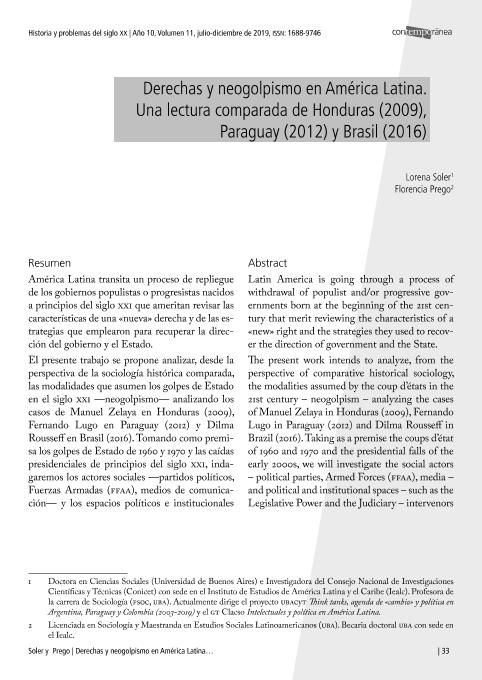Mostrar el registro sencillo del ítem
dc.contributor.author
Soler, Lorena Marina

dc.contributor.author
Prego, Florencia
dc.date.available
2022-10-28T14:02:14Z
dc.date.issued
2019-12
dc.identifier.citation
Soler, Lorena Marina; Prego, Florencia; Derechas y neogolpismo en América Latina: Una lectura comparada de Honduras (2009), Paraguay (2012) y Brasil (2016); Universidad de la República. Facultad de Humanidades y Ciencias de la Educación; Contemporánea; 11; 2; 12-2019; 33-52
dc.identifier.issn
1688-9746
dc.identifier.uri
http://hdl.handle.net/11336/175324
dc.description.abstract
América Latina transita un proceso de repliegue de los gobiernos populistas o progresistas nacidos a principios del siglo xxi que ameritan revisar las características de una «nueva» derecha y de las estrategias que emplearon para recuperar la dirección del gobierno y el Estado. El presente trabajo se propone analizar, desde la perspectiva de la sociología histórica comparada, las modalidades que asumen los golpes de Estado en el siglo xxi —neogolpismo— analizando los casos de Manuel Zelaya en Honduras (2009), Fernando Lugo en Paraguay (2012) y Dilma Rousseff en Brasil (2016). Tomando como premisa los golpes de Estado de 1960 y 1970 y las caídas presidenciales de principios del siglo xxi, indagaremos los actores sociales —partidos políticos, Fuerzas Armadas (ffaa), medios de comunicación— y los espacios políticos e institucionales —como el Poder Legislativo y el Poder Judicial— intervinientes que nos permitan pensar el carácter novedoso de estos procesos. Partimos de la hipótesis que, en el marco de los gobiernos populistas o progresistas en crisis, las fuerzas de derecha se nuclearon en el espacio político parlamentario generando las condiciones de posibilidad para destituir a presidentes constitucionales con herramientas del orden jurídico y político democrático. Una «nueva» derecha que apeló tanto al Poder Legislativo como al Poder Judicial para efectivizar los golpes de Estado, clausurado un proceso de cambio y buscando instaurar un nuevo ordenamiento social.
dc.description.abstract
Latin America is going through a process of withdrawal of populist and/or progressive governments born at the beginning of the 21st century that merit reviewing the characteristics of a «new» right and the strategies they used to recover the direction of government and the State. The present work intends to analyze, from the perspective of comparative historical sociology, the modalities assumed by the coup d’états in the 21st century – neogolpism – analyzing the cases of Manuel Zelaya in Honduras (2009), Fernando Lugo in Paraguay (2012) and Dilma Rousseff in Brazil (2016). Taking as a premise the coups d’état of 1960 and 1970 and the presidential falls of the early 2000s, we will investigate the social actors – political parties, Armed Forces (ffaa), media – and political and institutional spaces – such as the Legislative Power and the Judiciary – intervenors that allow us to think about the novel nature of these processes. We start from the hypothesis that within the framework of populist and/or progressive governments in crisis, the right-wing forces were nucleated in the parliamentary political space, generating the conditions of possibility to dismiss constitutional presidents with tools of the democratic legal and political order. A “new” right that appealed to both the Legislative Power and the Judicial Power to effect the coups d’état, closed a process of change and seeking to establish a new social order.
dc.format
application/pdf
dc.language.iso
spa
dc.publisher
Universidad de la República. Facultad de Humanidades y Ciencias de la Educación
dc.rights
info:eu-repo/semantics/openAccess
dc.rights.uri
https://creativecommons.org/licenses/by-nc-sa/2.5/ar/
dc.subject
NEOGOLPISMO
dc.subject
DERECHAS
dc.subject
BRASIL/HONDURAS/PARAGUAY
dc.subject
AMÉRICA LATINA
dc.subject.classification
Ciencias Sociales Interdisciplinarias

dc.subject.classification
Otras Ciencias Sociales

dc.subject.classification
CIENCIAS SOCIALES

dc.title
Derechas y neogolpismo en América Latina: Una lectura comparada de Honduras (2009), Paraguay (2012) y Brasil (2016)
dc.type
info:eu-repo/semantics/article
dc.type
info:ar-repo/semantics/artículo
dc.type
info:eu-repo/semantics/publishedVersion
dc.date.updated
2022-10-27T10:23:15Z
dc.journal.volume
11
dc.journal.number
2
dc.journal.pagination
33-52
dc.journal.pais
Uruguay

dc.journal.ciudad
Montevideo
dc.description.fil
Fil: Soler, Lorena Marina. Consejo Nacional de Investigaciones Científicas y Técnicas; Argentina. Universidad de Buenos Aires. Facultad de Ciencias Sociales. Instituto de Estudios de América Latina y el Caribe; Argentina
dc.description.fil
Fil: Prego, Florencia. Universidad de Buenos Aires. Facultad de Ciencias Sociales. Instituto de Estudios de América Latina y el Caribe; Argentina
dc.journal.title
Contemporánea

dc.relation.alternativeid
info:eu-repo/semantics/altIdentifier/url/http://revistacontemporanea.fhuce.edu.uy/index.php/Contemporanea/article/view/137
Archivos asociados
